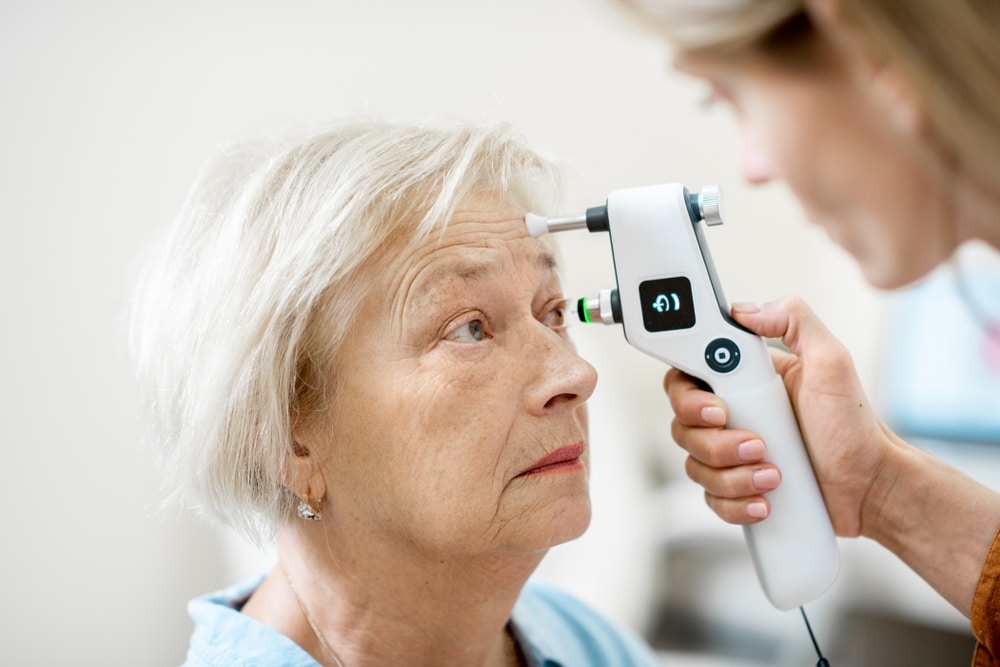Medically Reviewed by: Yasir Ahmed, M.D.
Cornea Transplant in Houston: A Guide
If you have suffered from an eye disease or have scarred corneal tissue, you may be a good candidate for a cornea transplant in Houston.
The cornea is the outermost layer of your eye. It is responsible for filtering light and accounts for 65-75% of your eye’s focusing power. Like any other part of the body, the cornea is susceptible to inflammation (called keratitis), infections, degenerations, inherited diseases like Fuchs’ dystrophy, and trauma. Depending on the severity, the damaged tissue can be replaced with either a full thickness corneal transplant (penetrating keratoplasty), partial thickness corneal transplant, or a back layer corneal transplant (endothelial keratoplasty, or EK).
Eye Center of Texas cornea subspecialty trained surgeons can help improve your vision with cornea surgery. We are recommended by more than 300 Houston eye doctors and stay on the cutting-edge of surgical advancements so that you can be sure you’re always getting the most up-to-date care.
Who is a good candidate for corneal transplant?
You might be wondering who is a good candidate for corneal transplant. A cornea transplant is an option for anyone with a damaged cornea accompanied by vision impairment that cannot be corrected by glasses or contact lenses. The following conditions put you at risk for cornea failure and may require a cornea transplant to relieve the symptoms:
- Scarring from infection (eye herpes or fungal keratitis)
- Scarring from eyelashes rubbing against the cornea (trichiasis)
- Inherited eye diseases (Fuchs’ dystrophy)
- Corneal ulcers or “sores”
- Corneal abrasion symptoms
- Advanced keratoconus
- Rare complications from LASIK surgery
- Chemical burns of the cornea
- Excessive corneal swelling
- Organ rejection from previous corneal transplant
- Cataract surgical complications
Continue reading: what to do for corneal abrasion.
Common Types of Corneal Transplant Surgery Options
Full Thickness Corneal Transplant
A penetrating keratoplasty (PK) replaces all of the layers of your cornea. Your ophthalmologist may suggest this procedure if you have suffered a severe cornea injury, bulging, and/or scarring.
Partial Thickness Corneal Transplant
Also known as a deep anterior lamellar keratoplasty (DALK), during a partial thickness cornea transplant, the surgeon replaces only the outer and middle layers of your cornea. This is a better option for individuals whose scarring does not reach the inner layers. Since the procedure doesn’t open up your eye, the healing time and chance for infection or eye damage decreases.
Endothelial Keratoplasty (EK)
Doctors usually opt for a back layer corneal transplant if the patient suffers from Fuchs’ dystrophy or other medical conditions. There are two types of endothelial keratoplasty: Descemet’s stripping endothelial keratoplasty (DSEK) and Descemet’s membrane endothelial keratoplasty (DMEK). An EK is for patients with damage only to the inner layer.
Recovery After a Corneal Transplant
The recovery time for a cornea transplant will depend on what type of transplant you have. PKs take the longest to recover since they require a full transplant. You will generally get to enjoy the final results after 18 months. DALKs require less recovery time than PKs. And EKs can sometimes heal between a few weeks and a couple of months.
You can speed up recovery time by taking good care of your eyes and avoiding activities that could scratch or damage your corneas including contact sports and rubbing your eyes.
Cornea Transplant Risk and Rejection
Although it’s only an issue in about 18-21% of cornea transplants, as with any transplant surgeries, there is a possibility for organ rejection. This happens when your immune system believes that the new tissue is a foreign body and tries to destroy it. Keep watch for the following symptoms that your body is rejecting the donor tissue:
- Eye pain
- Sensitivity to light
- Red eyes
- Cloudy or hazy vision
- Infection
- Bleeding
If you notice any of these symptoms, even one as seemingly small as noticing that my cornea is red, call Eye Center of Texas immediately. Your ophthalmologist may be able to use medication to stop your body from rejecting the transplanted cornea.
Other risks include infection and various eye problems such as glaucoma, macular degeneration, detached retina, and astigmatism.
Commonly asked questions
What is the success rate of a cornea transplant?
The success rate of a cornea transplant in favorable patients is as high as 90% in the first year. The three most common causes for graft failure include organ rejection, infection, and glaucoma.
Technology is improving everyday and with that, newer techniques are coming out that result in better visual outcomes, lower rates of organ rejection, and faster healing time. Our team of surgeons at Eye Center of Texas stay up-to-date on all micro-surgical procedure advancements so that we are always offering you the safest, most advanced surgical techniques.
How long does a corneal transplant last?
A corneal transplant can last up to 10 years without complications. If the graft does fail or you do start to experience some complications, corneal transplant surgery can be repeated.
How much is a cornea transplant in Texas?
Cost should never be a barrier to getting you the eye care you need. Speak with our doctors and staff to find a solution that works for your financial needs.
Trust Eye Center of Texas with your cornea transplant in Houston.
When it comes to choosing a surgeon for your cornea transplant in Houston, who you pick matters. Eye Center of Texas is a results-driven team of Texas eye specialists made up of some of the best-trained surgeons in Houston. Our doctors have years of experience providing the highest level of care for cornea transplant patients including Dr. Yasir Ahmed who is a top cornea specialist in our region.
Contact us today at 713-797-1010 or request an appointment online for the best cornea transplant Houston has to offer.
More Helpful Articles by Eye Center of Texas:
- What Causes Presbyopia?
- The Top Benefits of Femtosecond Laser Cataract Surgery
- Ophthalmologists in Houston You Can Trust
- Expectations: Your Vision After Getting Cataract Surgery in One Eye
- Your Guide on What to Expect After LASIK
Related Articles
Financing Options Available
Apply today to find a financing option that meets your needs.
Our Locations
Houston/Bellaire
6565 W. Loop S., Suite 650Bellaire, TX 77401
Medical Office:
713-797-1010
Medical Fax:
713-357-7276
LASIK/Near Vision:
Office: 713-395-1515
Fax: 713-357-7278
Pasadena
4415 Crenshaw RoadPasadena, TX 77504
Medical Office:
281-977-8800
Medical Fax:
281-977-8877
Sugar Land
15200 S.W. Freeway, Suite 130Sugar Land, TX 77478
Medical Office:
281-277-1010
Medical Fax:
281-277-4504
Clear Lake
455 E. Medical Center Blvd., Suite 110Webster, TX 77598
Medical Office:
281-332-1397
Medical Fax:
281-282-9152
Katy
Greenhouse Medical Plaza2051 Greenhouse Road, Suite 110
Houston, TX 77084
Medical Office:
346-547-7070
Medical Fax:
281-214-2971
The Woodlands/Conroe
100 Medical Center Blvd., Suite 118Conroe, TX 77304
Medical Office:
936-647-1610
Medical Fax:
936-647-1620


